Duiker W.J., Spielvogel J.J. The Essential World History. Volume 1: To 1800
Подождите немного. Документ загружается.

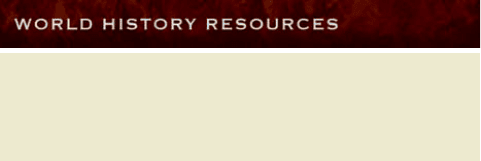
SUGGESTED READING
Rise of Japanese Civilization Some of the standard
treatments of the rise of Japanese civilization appear in textbooks
dealing with the early history of East Asia. Two of the best are J. K.
Fairbank, E. O. Reischauer, and A. M. Craig, East Asia: Tradition
and Transformation (Boston, 1989), and C. Schirokauer et al., A
Brief History of Chinese and Japanese Civilizations (San Diego,
Calif., 2005). For the latest scholarship on the early period, see the
first three volumes of The Cambridge History of Japan, ed. J. W.
Hall, M. B. Jansen, M. Kanai, and D. Twitchett (Cambridge, 1988).
Early History of Japan The best available collections of
documents on the early history of Japan are D. J. Lu, ed., Sources of
Japanese History, vol. 1 (New York, 1974), and W. T. de Bary et al.,
eds., Sources of Japanese Tradition, vol. 1 (New York, 2001).
For specialized books on the early historical period, see
R. J. Pearson, ed., Windows on the Japanese Past: Studies in
Archaeology and Prehistory (Ann Arbor, Mich., 1986). Also see
M. Ashkenazi, Handbook of Japanese Mythology (Santa Barbara,
Calif., 2003). The relationship between disease and state building is
analyzed in W. W. Farris, Population, Disease, and Land in Early
Japan, 645--900 (Cambridge, 1985). The Kamakura period is
covered in J. P. Mass, ed., Court and Bakufu in Japan: Essays in
Kamakura History (New Haven, Conn., 1982). See also H. P.
Varley, The Onin War (New York, 1977). On Japanese Buddhism,
see W. T. de Bary, ed., The Buddhist Tradition in India, China,
and Japan (New York, 1972).
Women’s Issues in Early Japan A concise and provocative
introduction to women’s issues during this period in Japan, as well
as in other parts of the world, can be found in S. S. Hughes and
B. Hughes, Women in World History (Armonk, N.Y., 1995). For a
tenth-century account of daily life for women at the Japanese court,
see I. Morris, trans. and ed., The Pillow Book of Sei Shonagon
(New York, 1991).
Japanese Literature The best introduction to Japanese literature
for college students is still the concise and insightful D. Keene,
Japanese Literature: An Introduction for Western Readers (London,
1953). The most compr ehensiv e anthology is Keene’s Anthology of
Japanese Literature (NewYork,1955),andthebesthistoryofJapanese
literature, also by Keene, is Seeds in the Heart: Japanese Liter ature
from Earlier Times to the Late Sixteenth Century (New York, 1993).
For the text of Lady Murasaki’s Tale of Genji, see the
translation by E. Seidensticker (New York, 1976). The most
accessible edition for college students is the same author’s abridged
Vintage Classics edition of 1990, which captures the spirit of the
original in 360 pages.
Japanese Art For the most comprehensive introduction to
Japanese art, consult P. Mason, History of Japanese Art (New York,
1993). Also see the concise J. Stanley-Baker, Japanese Art (London,
1984). For a stimulating text with magnificent illustrations, see
D. Elisseeff and V. Elisseeff, Art of Japan (New York, 1985). See
also J. E. Kidder Jr., The Art of Japan (London, 1985), for an
insightful text accompanied by beautiful photographs.
Korea For an informative and readable history of Korea, see
Lee Ki-baik, A New History of Korea (Cambridge, 1984). P. H. Lee,
ed., Sourcebook of Korean Civilization, vol. 1 (New York, 1993), is
a rich collection of documents dating from the period prior to the
sixteenth century.
Vietnam Vietnam often receives little attention in general
studies of Southeast Asia because it was par t of the Chinese
Empire for much of the traditional period. For a detailed
investigation of the origins of Vietnamese civilization, see K. W.
Tayl or, The Birth of Vietnam (Berkeley, Calif., 1983). For an
overview of Vietnamese history, with chapters on various themes,
see W. J. Duiker, Vietnam: Revolution in Transition (Boulder,
Colo., 1995).
Visit the website for The Essential World History to access study
aids such as Flashcards, Critical Thinking Exercises, and
Chapter Quizzes:
www.cengage.com/history/duikspiel/essentialworld6e
284 CHAPTER 11 THE EAST ASIAN RIMLANDS: EARLY JAPAN, KOREA, AND VIETNAM
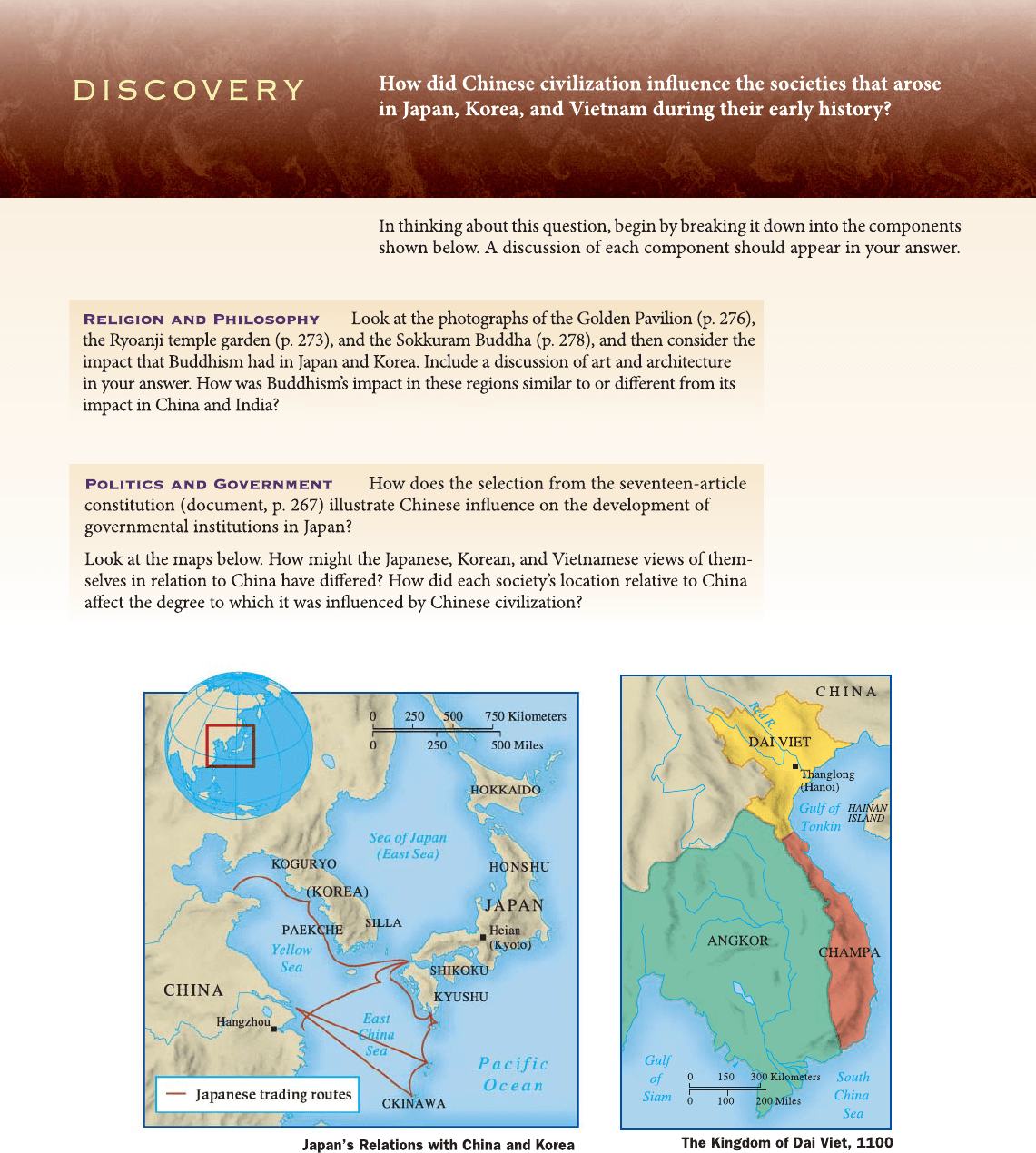
285
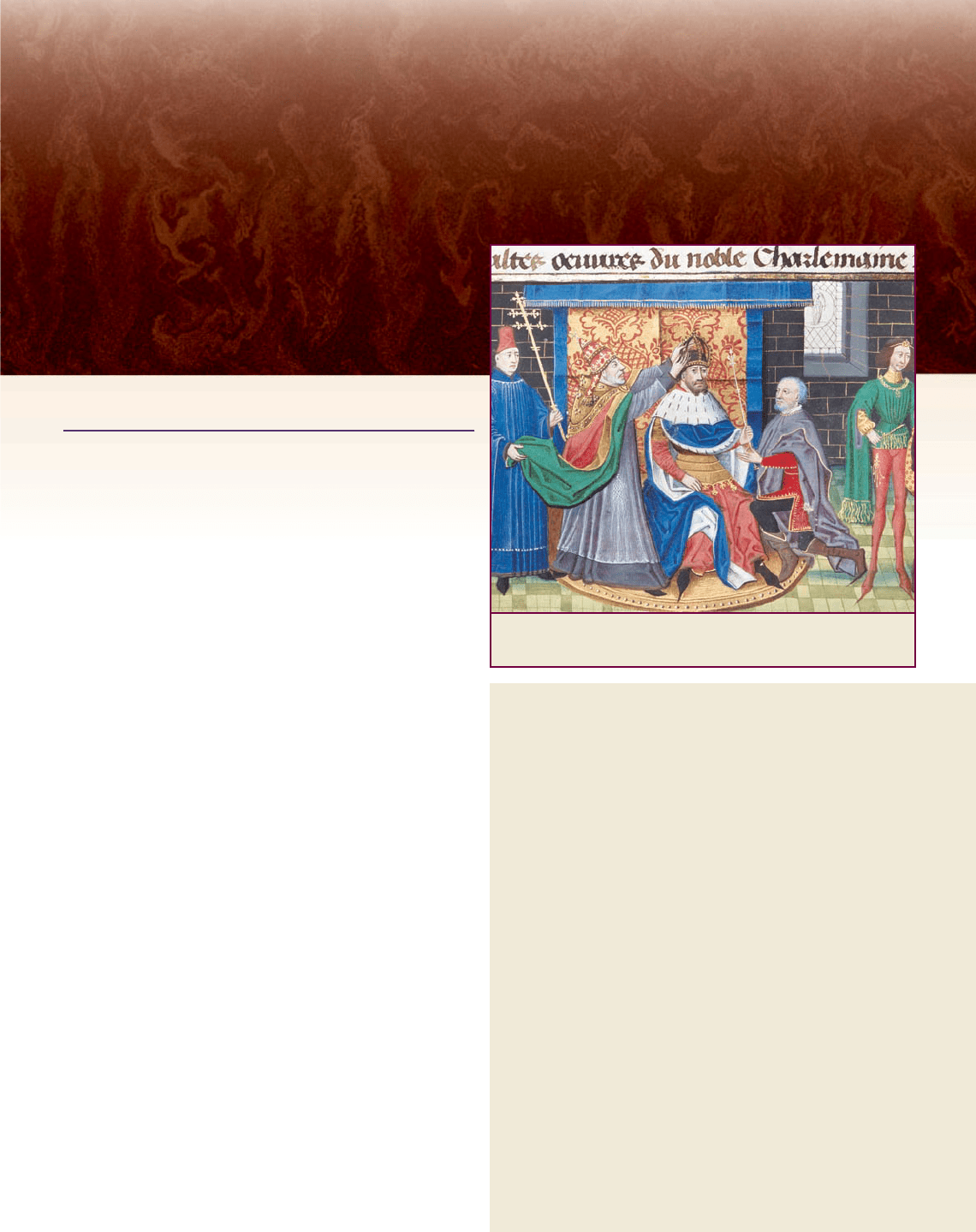
CHAPTER 12
THE MAKING OF EUROPE
CHAPTER OUTLINE
AND FOCUS QUESTIONS
The Emergence of Europe in the Early Middle Ages
Q
What contributions did the Romans, the Christian
church, and the Germanic peoples make to the new
civilization that emerged in Europe after the collapse of
the western Roman Empire? What was the significance
of Charlemagne’s coronation as emperor?
Europe in the High Middle Ages
Q
What roles did aristocrats, peasants, and townspeople
play in medieval European civilization, and how did
their lifestyles differ? How did cities in Europe compare
with those in China and the Middle East? What were the
main aspects of the political, economic, spiritu al, and
cultural revivals that took place in Europe during the
High Middle Ages?
Medieval Europe and the World
Q
In what ways did Europeans begin to relate to peoples
in other parts of the world after 1000
C.E.? What were
the reasons for the Crusades, and who or what benefited
the most from the experience of the Crusades?
CRITICAL THINKING
Q
In what ways was the civilization that developed in
Europe in the Middle Ages similar to those in China and
the Middle East? How was it different?
A medieval French manuscript illustration of the coronation
of Charlemagne by Pope Leo III
c
Scala/Art Resource, NY
286
IN 800, CHARLEMAGNE, the king of the Franks, journeyed to
Rome to help Pope Leo III, head of the Catholic church, who was
barely clinging to power in the face of rebellious Romans. On
Christmas Day, Charlemagne and his family, attended by Romans
and Franks, crowded into Saint Peter’s Basilica to hear Mass. Quite
unexpectedly, according to a Frankish writer, ‘‘as the king rose from
praying before the tomb of the blessed apostle Peter, Pope Leo
placed a golden crown on his head.’’ The people in the church
shouted, ‘‘Long life and victory to Charles Augustus, crowned by
God the great and peace-loving Emperor of the Romans.’’ Seemingly,
the Roman Empire in the west had been reborn, and Charles had
become the first Roman emperor since 476. But this ‘‘Roman em-
peror’’ was actually a German king, and he had been crowned by
the head of the western Christian church. In truth, the coronation
of Charlemagne was a sign not of the rebirth of the Roman Empire
but of the emergence of a new European civilization that came into
being in western Europe after the collapse of the western Roman
Empire.
This new civilization---European civilization---was formed by
the coming together of three major elements: the legacy of the Ro-
mans, the Christian church, and the Germanic peoples who moved

The Emergence of Europe
in the Early Middle Ages
Q
Focus Questions: What contributions did the Romans,
the Christian church, and the Germanic peoples
make to the new civilization that emerged in Europe
after the collapse of the western Roman Empire?
What was the significance of Charlemagne’s
coronation as emperor?
As we saw in Chapter 10, China descended into political
chaos and civil wars after the end of the Han Empire, and
it was almost four hundred years before a new imperial
dynasty established political order. After the collapse of
the western Roman Empire in the fifth century, it would
also take hundreds of years to establish a new society.
The New Germanic Kingdoms
Already in the third century C.E., Germanic peoples in
large numbers had begun to move into the lands of the
Roman Empire, and by 500, the western Roman Empire
had been replaced politically by a series of successor states
ruled by German kings. The fusion of Romans and
Germans took different forms in the various Germanic
kingdoms. Both the kingdom of the Ostrogoths in Italy
and the kingdom of the Visigoths in Spain (see Map 12.1)
maintained the Roman structure for the larger native
populations, while a Germanic warrior caste came to
dominate. Over a period of time, Germans and natives
began to fuse. In Britain, however, after the Roman ar-
mies withdrew at the beginning of the fifth century, the
Angles and Saxons, Germanic tribes from Denmark and
northern Germany, moved in and settled there.
Only one of the German states on the European
continent proved long-lasting---the kingdom of the Franks.
The establishment of a Frankish kingdom was the work of
Clovis (c. 482--511), who became a Catholic Christian
around 500. By 510, Clovis had established a powerful
new Frankish kingdom stretching from the Pyrenees in the
west to German lands in the east (modern France and
western Germany). After Clovis’s death, however, as was
the Frankish custom, his sons divided his newly created
kingdom, and during the sixth and seventh centuries, the
once-united Frankish kingdom came to be divided into
three major areas: Neustria, Austrasia, and Burgundy.
The Role of the Christian Church
By the end of the fourth century, Christianity had become
the predominant religion of the Roman Empire. As the
official Roman state disintegrated, the Christian church
played an increasingly important role in the growth of the
new European civilization.
The Organization of the Church By the fourth century,
the Christian church had developed a system of govern-
ment. The Christian community in each city was headed
by a bishop, whose area of jurisdiction was known as a
bishopric, or diocese; the bishoprics of each Roman
province were joined together under the direction of
an archbishop. The bishops of four great cities---Rome,
Jerusalem, Alexandria, and Antioch---held positions of
special power in church affairs. Soon, however, one of
them---the bishop of Rome---claimed that he was the sole
leader of the western Christian church, which came to be
known as the Roman Catholic Church. According to
church tradition, Jesus had given the keys to the kingdom
of heaven to Peter, who was considered the chief apostle
and the first bishop of Rome. Subsequent bishops of
Rome were considered Peter’s successors and came to be
known as popes (from the Latin word papa, meaning
‘‘father’’). By the sixth century, popes had been successful
in extending papal authority over the Christian church in
the west and converting the pagan peoples of Germanic
Europe. Their primary instrument of conversion was the
monastic movement.
The Monks and Their Missions A monk (in Latin,
monachus, meaning ‘‘someone who lives alone’’) was a man
who sought to liv e a life divorc ed from the w orld, cut off
from ordinary human society, in order to pursue an ideal
of total dedica tion to God. As the monastic ideal spread, a
new form of monasticism based on living together in a
community soon became the dominant form. Saint Benedict
(c. 480--c. 543), who founded a monastic house for which
he wrote a set of rules, established the basic form of
monastic life in the western Christian church.
Benedict’s rule divided each day into a series of ac-
tivities. All monks were required to do physical work of
some kind for several hours a day because idleness was
‘‘the enemy of the soul.’’ At the very heart of community
practice was prayer, the proper ‘‘work of God.’’ Although
this included private meditation and reading, all of the
monks gathered together seven times during the day for
THE EMERGENCE OF EUROPE IN THE EARLY MIDDLE AGES 287
in and settled the western empire. European civilization developed
during a period that historians call the Middle Ages, or the medieval
period, which lasted from about 500 to about 1500. To the historians
who first used the name, the Middle Ages was a middle period be-
tween the ancient world and the modern world. During the Early
Middle Ages, from about 500 to 1000
C.E., the Roman world of the
western empire was slowly transformed into a new Christian Euro-
pean society.
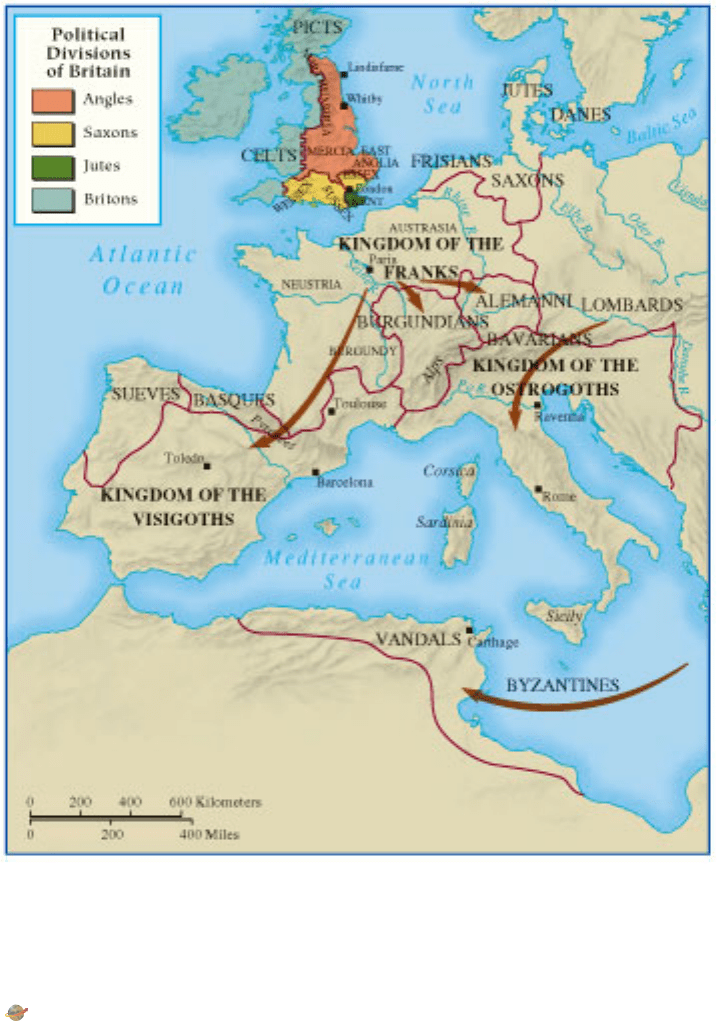
common prayer and chanting of psalms. The Benedictine
life was a communal one. Monks ate, worked, slept, and
worshiped together.
Each Benedictine monastery was strictly ruled by an
abbot, or ‘‘father’’ of the monastery, who had complete
authority over his fellow monks. Unquestioning obedi-
ence to the will of the abbot was expected of every monk.
Each Benedictine monastery
held lands that enabled it to be
a self-sustaining community,
isolated from and independent
of the world surrounding it.
Within the monastery, however,
monks were to fulfill their vow
of poverty: ‘‘Let all things be
common to all, as it is written,
lest anyone should say that
anything is his own.’’
1
Only
men could be monks, but
women, called nuns, also began
to withdraw from the world to
dedicate themselves to God.
Monasticism played an in-
dispensable role in early medi-
eval civilization. Monks became
the new heroes of Christian
civilization, and their dedication
to God became the highest ideal
of Christian life. They were the
social workers of their commu-
nities: monks provided schools
for the young, hospitality for
travelers, and hospitals for the
sick. M onks also c opied Latin
works and passed on the legacy
of the ancient world to the new
Eur opean civilization. Monas-
teries bec ame centers of learning
wherever they wer e located, and
monks work ed to spr ead Chris-
tianity to all of Europe.
Womenplayedanimportant
role in the monastic missionary
mov ement and the con v ersion of
the Germanic kingdoms. Some
served as abbesses (an abbess was
the head of a monastery or a
con vent for nuns); many abbesses
came from aristocratic families,
especially in Anglo-Saxon En-
gland. In the kingdom of
N orthumbria, for example, Saint
Hilda founded the monastery of
Whitb y in 657. As abbess, she was responsible for making
learning an important part of the life of the monastery .
Charlemagne and the Carolingians
During the seventh and eighth centuries, as the kings of the
Frankish kingdom gradually lost their power, the may ors of
MAP 12.1 The Germanic Kingdoms of the Old W estern Empire. The Germanic tribes
filled the power vacuum caused by the demise of the Roman Empire, building states that
blended elements of Germanic customs and laws with those of Roman culture, including
large-scale conversions to Christianity. The Franks established the most durable of these
Germanic states.
Q
Which Germanic tribes settled in the present-day countries of E ur ope?
View an animated version of this map or related maps at www.c engage.com/history/
duikspiel/essentialworld6e
288 CHAPTER 12 THE MAKING OF EUROPE
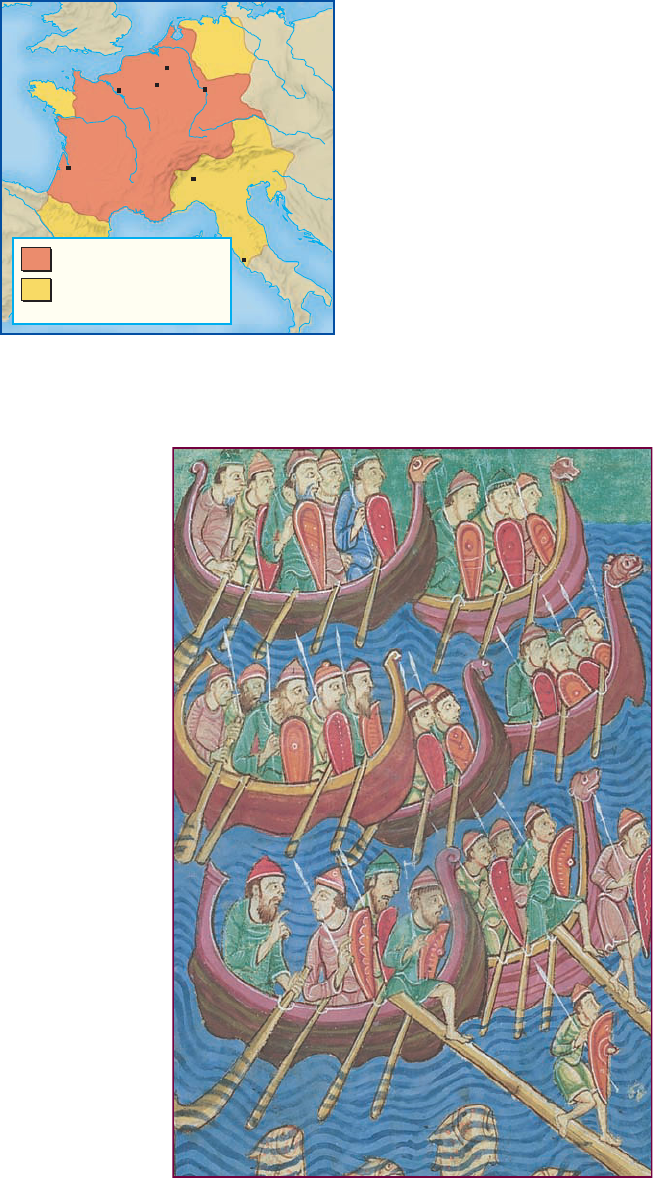
the palace---the chief officers of the
king’s household---assumed more con-
trol of the kingdom. One of these
mayors, Pepin, finally took the logical
step of assuming the kingship of the
Frankish state for himself and his fam-
ily. Upon his death in 768, his son came
to the thr one of the F rankish kingdom.
This new king was the dynamic
and powerful ruler known to history
as Charles the Great (768--814), or
Charlemagne (from the Latin Carolus
Magnus). He was determined and
decisive, intelligent and inquisitive, a
strong statesman, and a pious Chris-
tian. Though he himself was unable to
read or write, he was a wise patron of learning. In a series
of military campaigns, he greatly expanded the territory
he had inherited and created what came to be known as
the Carolingian Empire. At its height, Charlemagne’s
empire covered much of western and central Europe (see
the box on p. 290).
The Significance of Charlemagne As Charlemagne’s
power gr ew, so did his prestige as the most powerful
Christian ruler of what one monk even called the ‘‘king-
dom of Europe.’’ In 800, Charlemagne acquired a new title:
emperor of the Romans. The significance of this imperial
coronation has been much debated by historians. We are
not even sure if the pope or Charlemagne initiated the idea
when they met in the summer of 799 in Paderborn in
German lands or whether he was pleased or displeased.
In any case, Charlemagne’s coronation as Roman em-
peror d emonstrated the strength, ev en after three hundr ed
years, of the concept of an enduring Roman Empire. M ore
important, it symbolized the fusion of Roman, Christian,
and Germanic elements: a Germanic king had been
crowned emperor of the Romans by the spiritual leader of
western Christendom. Charlemagne had assembled an
empire that stretched from the North Sea to Italy and from
the Atlantic Oc ean to the Danube River. This differed sig-
nificantly from the Roman Empire, which encompassed
much of the Mediterranean world. Had a new civilization
emerged? And should Charlemagne be regar ded, as one of
his biographers has argued, as the ‘‘father of Eur ope’’?
2
The World of Lords and Vassals
The Car olingian Empire began to disintegrate soon after
Charlemagne’s dea th in 814, and less than thirty years later,
in 843, it was divided among his grandsons into three
major sections. Invasions in different parts of the old
Carolingian world added to the process of disintegration.
Invasions of the Ninth and Tenth
Centuries
In the ninth and tenth
centuries, western Euro pe was beset
by a wa ve of invasions. M uslims at-
tacked the southern coasts of Europe
and sent raiding parties into southern
France. The Magyars, a people from
western Asia, mo ved into central Eu-
rope at the end of the ninth c entury
and settled on the plains of H ungary;
from ther e they made forays into
western Europe. Finally crushed at the
Battle of Lechfeld in Germany in 955,
the Magyars conv erted to Christianity
and settled do wn to create the king-
dom of H ungary.
The most far-reaching attacks of the time came from
the Northmen or Norsemen of Scandinavia, also known
SAXONY
BAVARIA
PEOPLES
VENETIA
PAPAL
STATES
BURGUNDY
ALEMANNI
AUSTRASIA
NEUSTRIA
BRITTANY
SPANISH
MARCH
AQUITAINE
TRIBUTARY
SLAVIC
FRISIA
Bordeaux
Paris
Aachen
Mainz
Milan
Rome
Verdun
A
l
p
s
R.
R.
O
d
e
r
R.
S
e
i
n
e
R
.
D
a
n
u
b
e
E
l
b
e
R
h
i
n
e
L
o
i
r
e
R
.
P
y
r
e
n
e
e
s
Corsica
Sardinia
A
d
r
i
a
t
i
c
S
e
a
Frankish kingdom, 768
Territories gained
by Charlemagne
Charlemagne’s Empire
The Vik ings At tack England. This illustration from an eleventh-
century English manuscript depicts a band of armed Vikings invading
England. Two ships have already reached the shore, and a few Vikings are
shown walking down a long gangplank onto English soil.
c
The Pierpont Morgan Library, New York /Art Resource, NY
THE EMERGENCE OF EUROPE IN THE EARLY MIDDLE AGES 289
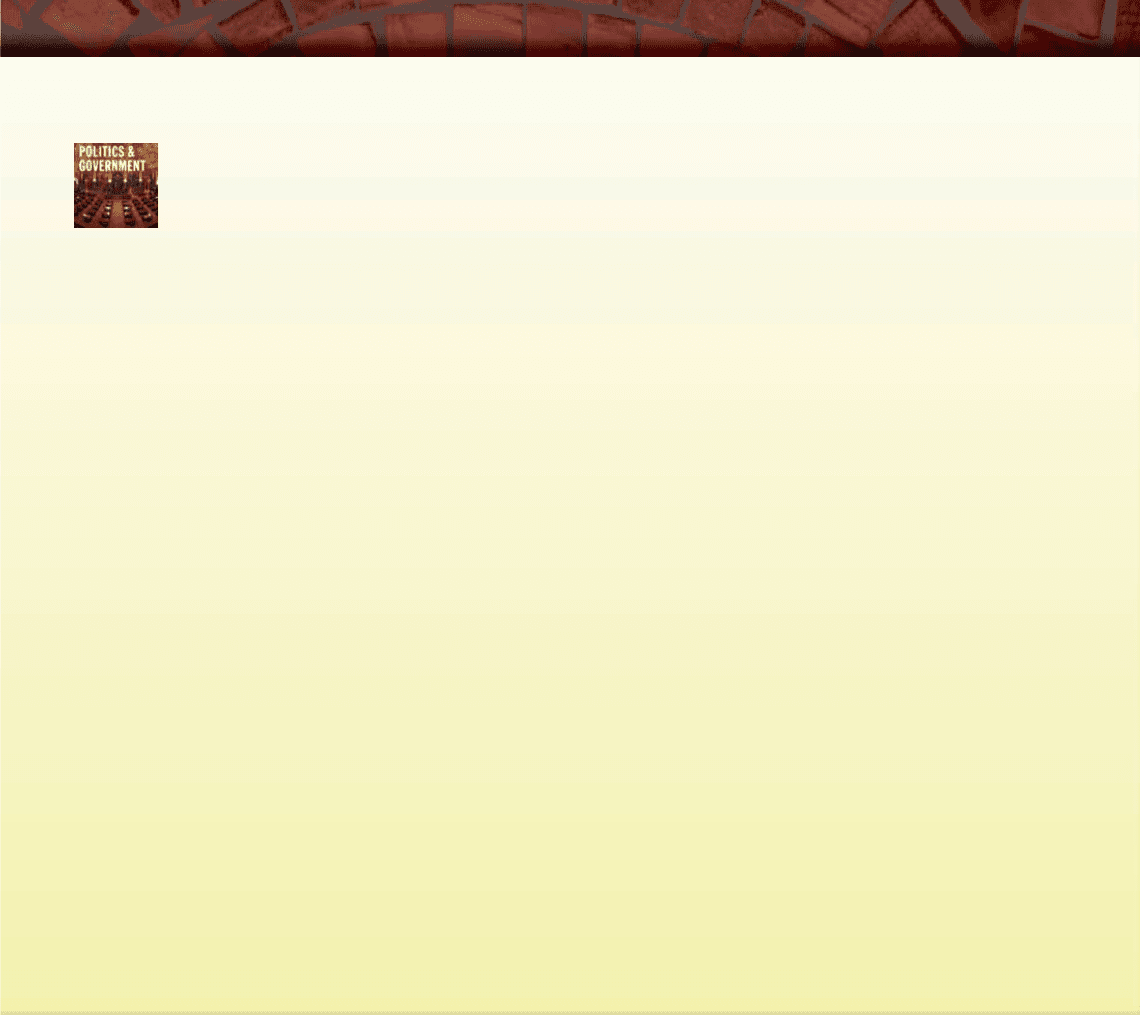
to us as the Vikings. The Vikings were warriors whose
love of adventure and search for booty and new avenues
of trade may have led them to invade other areas of
Europe. Viking ships were the best of the period. Their
shallow draft enabled them to sail up European rivers
and attack places at some distance inland. In the ninth
century, Vikings sacked villages and towns, destroyed
churches, and easily defeated small local armies.
By the mid-ninth century, the Northmen had begun
to build winter settlements in different areas of Europe.
By 850, groups of Norsemen from Norway had settled in
Ireland, and Danes occupied northeastern England by 878.
Beginning in 911, the ruler of the western Frankish lands
gave one band of Vikings land at the mouth of the Seine
River, forming a section of France that came to be known
as Normandy. This policy of settling the Vikings and
converting them to Christianity was a deliberate one; by
their conversion to Christianity, the Vikings were soon
made a part of European civilization.
The Development of Fief-Holding The disintegration of
central authority in the Carolingian world and the invasions
by Muslims, Magyars, and Vikings led to the emergence
of a new type of relationship between free individuals.
THE ACHIEVEMENTS OF CHARLEMAGNE
Einhard, the biographer of Charlemagne, was born
in the valley of the Main River in Germany about
775. Raised and educated in the monastery of
Fulda, an important center of learning, he arrived
at the court of Charlemagne in 791 or 792. Although he did not
achieve high office under Charlemagne, he served as private
secretary to Louis the Pious, Charlemagne’s son and succes-
sor. In this selection, Einhard discusses some of Charle-
magne’s accomplishments.
Einhard, Life of Charlemagne
Such are the wars, most skillfully planned and successfully fought,
which this most powerful king waged during the forty-seven years
of his reign. He so largely increased the Frank kingdom, which was
already great and strong when he received it at his father’s hands,
that more than double its former territory was added to it. ...
He subdued all the wild and barbarous tribes dwelling in Germany
between the Rhine and the Vistula, the Ocean and the Danube, all
of which speak very much the same language, but differ widely
from one another in customs and dress. ...
He added to the glory of his reign by gaining the good will of
several kings and nations; so close, indeed, was the alliance that he
contracted with Alfonso, King of Galicia and Asturias, that the latter,
when sending letters or ambassadors to Charles, invariably styled
himself his man. ... The Empe rors of Constantinople [the Byzantine
emperors] sought friendship and alliance with Charles by several
embassies; and even when the Greeks [the Byzantines] suspected
him of designing to take the empire from them, because of his as-
sumption of the title Emperor, they made a close alliance with him,
that he might have no cause of offense. In fact, the power of the
Franks was always viewed with a jealous eye, whence the Greek
proverb, ‘‘Have the Frank for your friend, but not for your
neighbor.’’
This King, who showed himself so great in extending his em-
pire and subduing foreign nations, and was constantly occupied
with plans to that end, undertook also very many works calculated
to adorn and benefit his kingdom, and brought several of them to
completion. Among these, the most deserving of mention are the
basilica of the Holy Mother of God at Aix-la-Chapelle [Aachen],
built in the most admirable manner, and a bridge over the Rhine
River at Mainz, half a mile long, the breadth of the river at this
point. ... Above all, sacred buildings were the object of his care
throughout his whole kingdom; and whenever he found them falling
to ruin from age, he commanded the priests and fathers who had
charge of them to repair them, and made sure by commissioners
that his instructions were obeyed. ... Thus did Charles defend and
increase as well as beautify his kingdom. ...
He cherished with the greatest fervor and devotion the princi-
ples of the Christian religion, which had been instilled into him
from infancy. Hence it was that he built the beautiful church at Aix-
la-Chapelle, which he adorned with gold and silver and lamps, and
with rails and doors of solid brass. He had the columns and marbles
for this structure brought from Rome and Ravenna, for he could
not find such as were suitable elsewhere. He was a constant wor-
shiper at this church as long as his health permitted, going morning
and evening, even after nightfall, besides attending mass. ...
He was very forward in caring for the poor, so much so that he
not only made a point of giving in his own country and his own
kingdom, but when he discovered that there were Christians living
in poverty in Syria, Egypt, and Africa, at Jerusalem, Alexandria, and
Carthage, he had compassion on their wants, and used to send
money over the seas to them. ... He sent great and countless gifts
to the popes, and throughout his whole reign the wish that he had
nearest at heart was to reestablish the ancient authority of the city
of Rome under his care and by his influence, and to defend and
protect the Church of St. Peter, and to beautify and enrich it out of
his own store above all other churches.
Q
How long did Einhard know Charlemagne? Does this excerpt
reflect close, personal knowledge of the man, his court, and his
works or hearsay and legend?
290 CHAPTER 12 THE MAKING OF EUROPE

When governments ceased to be able to defend their
subjects, it became important to find some powerful lord
who could offer protection in return for service. The
contract sworn between a lord and his subordinate (known
as a vassal) was the basis of a form of social orga nization
that later generatio ns of historians viewed as an organized
system of government, which they called feudalism. But
feudalism was never a system, and man y historians today
prefer to avoid using the term (see the comparative essay
‘‘Feudal Orders Around the World’’ on p . 269).
With the breakdown of royal governments, powerful
nobles took control of large areas of land. They needed
men to fight for them, so the practice arose of giving
grants of land to vassals who in return would fight for
their lord. The Frankish army had originally consisted of
foot soldiers, dressed in coats of mail and armed with
swords. But in the eighth century, a military change began
to occur when larger horses and the stirrup were intro-
duced. Earlier, horsemen had been throwers of spears.
Now they came to be armored in coats of mail (the larger
horse could carry the weight) and wielded long lances
that enabled them to act as battering rams (stirrups kept
them on their horses). For almost five hundred years,
warfare in Europe would be dominated by these mounted
warriors, or knights, as they were called. The knights came
to have the greatest social prestige and formed the
backbone of the European aristocracy.
Of course, a horse, armor, and weapons were ex-
pensive, and it took time and much practice to learn to
wield these instruments skillfully from horseback. Con-
sequently, lords who wanted men to fight for them had to
grant each vassal a piece of land that provided for the
support of the vassal and his family. In return for the
land, the vassal provided his lord with his fighting skills.
Each needed the other. In the Early Middle Ages, when
there was little trade and wealth was based primarily on
land, land was the most important gift a lord could give
to a vassal in return for his military service.
Bytheninthcentury,thegrantoflandmadetoavassal
had become known as a fief. A fief was a piece of land held
from the lord by a vassal in return for military service, but
vassals who held such grants of land also came to exercise
rights of jurisdiction or political and legal authority
within their fiefs. As the Carolingian world disintegrated
politically under the impact of internal dissension and
invasions, an increasing number of powerful lords arose
who were now responsible for keeping order.
Fief-holding came to be characterized by a set of
practices that determined the relationship between a lord
and his vassal. The major obligation of a vassal to his lord
was to perform military service, usually about forty days a
year. A vassal was also required to appear at his lord’s
court when summoned to give advice to the lord. He
might also be asked to sit in judgment in a legal case,
since the important vassals of a lord were peers and only
they could judge each other. Finally, vassals were also
responsible for aids, or financial payments to the lord, on
a number of occasions. In turn, a lord also had respon-
sibilities toward his vassals. His major obligation was to
protect his vassal, either by defending him militarily or by
taking his side in a court of law. The lord was also re-
sponsible for the maintenance of the vassal, usually by
granting him a fief.
The Manorial System The landholding class of nobles
and knights contained a military elite whose ability to
function as warriors depended on having the leisure time
to pursue the arts of war. Landed estates, or manors,
located on the fiefs given to a vassal by his lord and
worked by a dependent peasant class, provided the eco-
nomic sustenance that made this way of life possible. A
manor was simply an agricultural estate operated by a
lord and worked by peasants. Although a large class of
free peasants continued to exist, increasing numbers of
free peasants became serfs---persons bound to the land
and required to provide labor services, pay rents, and be
subject to the lord’s jurisdiction. By the ninth century,
probably 60 percent of the population of western Europe
had become serfs.
Labor services consisted of working the lord’s
demesne, the land r etained by the lord, which might
consist of one-third to one-half of the cultivated lands
scattered thr oughout the manor. The rest would be used by
the peasants for themselves. Building barns and digging
ditches were also part of the labor services. Serfs usually
work ed about three days a week for their lord and paid
rents by giving the lord a share of every product they raised.
Serfs were legally bound to the lord’s lands and could
not leave without his permission. Although free to marry,
serfs could not marry anyone outside their manor without
the lord’s approval. Moreover, lords sometimes exercised
public rights or political authority on their lands, which
gave them the right to try peasants in their own courts.
Europe in the High Middle Ages
Q
Focus Questions: What roles did aristocrats , peasants,
and townspeople play in medieval European
civilization, and how did their lifestyles differ? How
did cities in Europe compare with those in China and
the Middle East? What were the main aspects of the
political, economic, spiritual, and cultural revivals that
took place in Europe during the High Middle Ages?
The new European civilization that had emerged in the
Early Middle Ages began to flourish in the High Middle
EUROPE IN THE HIGH MIDDLE AGES 291
Ages (1000--1300). New agricultural practices that in-
creased the food supply helped give rise to commercial
and urban expansion. Both lords and vassals recovered
from the invasions and internal dissension of the Early
Middle Ages, while medieval kings began to exert a cen-
tralizing authority. The recovery of the Catholic church
made it a forceful presence in every area of life. The High
Middle Ages also gave birth to a cultural revival.
Land and People
In the Early Middle Ages, Europe had a relatively small
population, but in the High Middle Ages, the number of
people nearly doubled, from 38 to 74 million. What ac-
counted for this dramatic increase? For one thing, con-
ditions in Europe were more settled and more peaceful
after the invasions of the Early Middle Ages had ended.
For another, agricultural production surged after 1000.
The New Agriculture During the High Middle Ages,
Europeans began to farm in new ways. An improvement
in climate resulted in better growing conditions, but an
important factor in increasing food production was the
expansion of cultivated or arable land, accomplished by
clearing forested areas. Peasants of the eleventh and
twelfth centuries cut down trees and drained swamps.
Technological changes also furthered the develop-
ment of farming. The Middle Ages saw an explosion of
labor-saving devices, many of which were made from
iron, which was mined in different areas of Europe. Iron
was used to make scythes, axes, and hoes for use on farms
as well as saws, hammers, and nails for building purposes.
Iron was crucial in making the carruca, a heavy, wheeled
plow with an iron plowshare pulled by teams of horses,
which could turn over the heavy clay soil found north of
the Alps.
Besides using horsepower, the High Middle Ages
harnessed the power of water and wind to do jobs for-
merly done by humans or animals. Located along
streams, mills powered by water were used to grind grains
and produce flour. Where rivers were lacking or not easily
dammed, Europeans developed windmills to harness the
power of the wind.
The shift from a two-field to a three-field system also
contributed to the increase in food production (see the
comparative illustration on p. 293). In the Early Middle
Ages, peasants planted one field while another of equal
size was allowed to lie fallow to regain its fertility. Now
estates were divided into three parts. One field was
planted in the fall with winter grains, such as rye and
wheat, and spring grains, such as oats or barley, and
vegetables, such as peas or beans, were planted in the
second field. The third was allowed to lie fallow. By
rotating their use, only one-third rather than one-half of
the land lay fallow at any time. The rotation of crops also
kept the soil from being exhausted so quickly, and more
crops could now be grown.
Daily Life of the Peasantry The lifestyle of the peasants
was quite simple. Their cottages were made of wood
frames surrounded by sticks with the space between them
filled with rubble and then plastered over with clay. Roofs
were simply thatched. The houses of poorer peasants
consisted of a single room, but others had at least two
rooms---a main room for cooking, eating, and other ac-
tivities and another room for sleeping.
Peasant women occupied both an important and a
difficult position in manorial society. They were expected
to carry and bear their children and at the same time
fulfill their obligation to labor in the fields. Their ability
to manage the household might determine whether a
peasant family would starve or survive in difficult times.
Though simple, a peasant’s daily diet was adequate
when food was available. The staple of the peasant diet,
and the medieval diet in general, was bread. Women
made the dough for the bread at home, then brought
their loaves to be baked in community ovens, which were
owned by the lord of the manor. Peasant bread was highly
nutritious, containing not only wheat and rye but also
barley, millet, and oats, giving it a dark appearance and a
very heavy, hard texture. Bread was supplemented by
numerous vegetables from the household gardens, cheese
from cow’s or goat’s milk, nuts and berries from wood-
lands, and fruits, such as apples, pears, and cherries.
Chickens provided eggs and sometimes meat.
The Nobility of the Middle Ages In the High Middle
Ages, European society, like that of Japan during the same
period, was dominated by men whose chief concern was
warfare. Like the Japanese samurai, many nobles loved
war. As one nobleman wrote:
And well I like to hear the call of ‘‘Help’’ and see the
wounded fall,
Loudly for mercy praying,
And see the dead, both great and small,
Pierced by sharp spearheads one and all.
3
The men of war were the lords and vassals of medieval
society.
The lords were the kings, dukes, counts, barons, and
viscounts (and even bishops and archbishops) who had
extensive landholdings and wielded considerable political
influence. They formed an aristocracy or nobility of
people who held real political, economic, and social
power. Both the great lords and ordinary knights were
292 CHAPTER 12 THE MAKING OF EUROPE
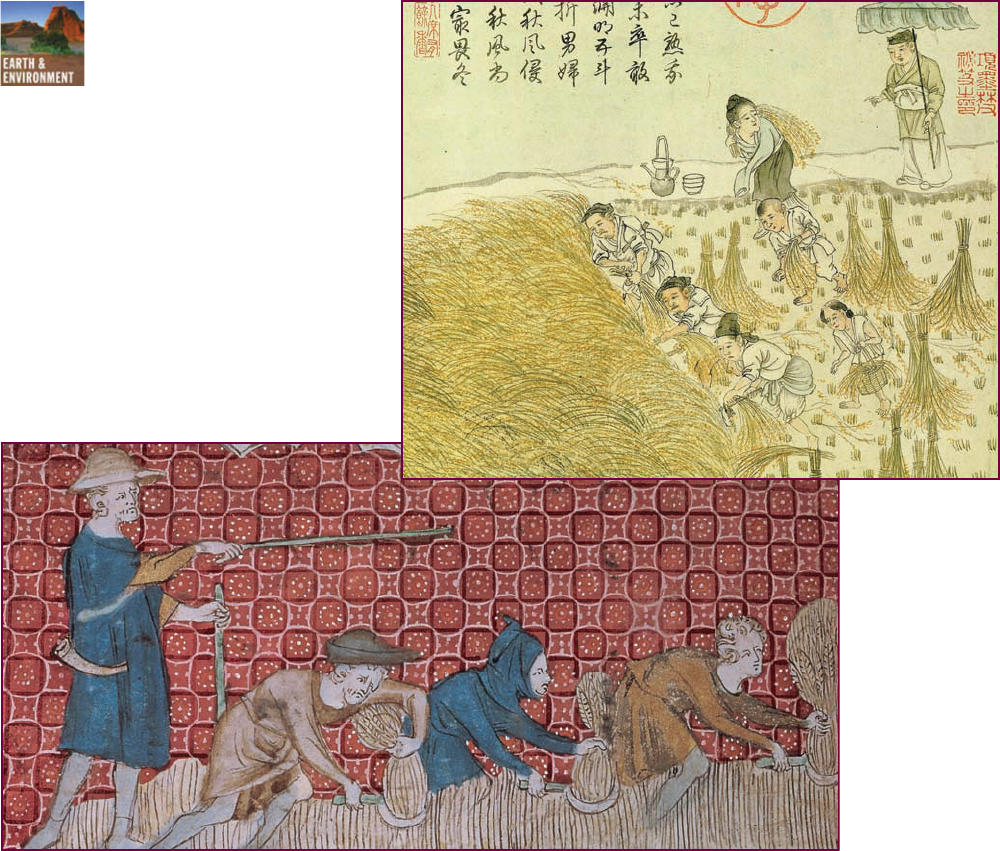
warriors, and the institution of knighthood united them.
But there were also social divisions among them based on
extremes of wealth and landholdings.
Although aristocratic women could legally hold
property, most women remained under the control of
men---their fathers until they married and their husbands
after that. Nevertheless, these women had many oppor-
tunities for playing important roles. Because the lord was
often away at war or at court, the lady of the castle had to
manage the estate. Households could include large
numbers of officials and servants, so this was no small
responsibility.
Although women were expected to be subservient to
their husbands, there were many strong women who
advised and sometimes even dominated their husbands.
Perhaps most famous was Eleanor of Aquitaine (c. 1122--
1204). Married to King Louis VII of France, Eleanor ac-
companied her husband on a Crusade, but her alleged
affair with her uncle during the Crusade led Louis to have
their marriage annulled. Eleanor then married Henry,
duke of Normandy and count of Anjou, who became
King Henry II of England in 1154. She took an active role
in politics, even assisting her sons in rebelling against
Henry in 1173 and 1174.
The New World of Trade and Cities
Medieval Europe was an overwhelmingly agrarian society,
with most people living in small villages. In the eleventh
and twelfth centuries, however, new elements were
COMPARATIVE
ILLUSTRATION
The New Agriculture in the
Medieval World.
New agricultural
methods and techniques in the Middle Ages
enabled peasants in both Europe and China to
increase food production. This general
improvement in diet was a factor in supporting
noticeably larger populations in both areas. At the
bottom, a thirteenth-century illustration shows a
group of English peasants harvesting grain.
Overseeing their work is a bailiff, or manager.
At the right, a thirteenth-century painting shows
Chinese peasants harvesting rice, which became
the staple food in China.
Q
How important were staple foods (such as
wheat and rice) in the diet and health of people
in Europe and Chi na during the Middle Ages?
c
The Art Archive/Freer Gallery of Art, Washington, DC
c
The Art Archive/British Library, London, UK
EUROPE IN THE HIGH MIDDLE AGES 293
